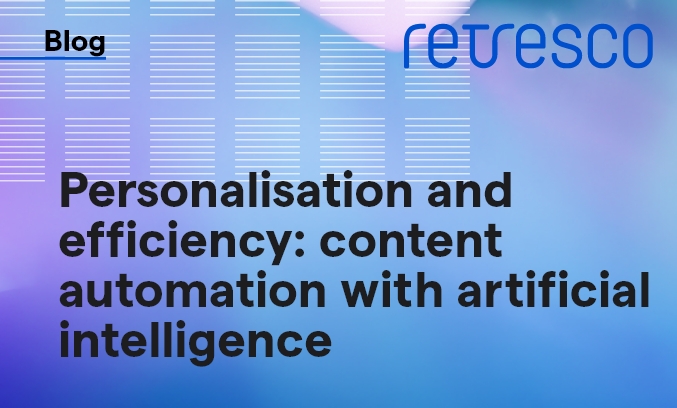Blog
Personalisation and efficiency: content automation with artificial intelligence
Artificial intelligence is ubiquitous. Whether in voice assistants, chatbots, semantic text analyses, streaming services, smart factories or autonomous vehicles: AI already supports private and professional daily life and will significantly change society and the economy.

And although more and more people are using artificial intelligence, only a few know what exactly it is. This is hardly surprising: defining artificial intelligence in a clear-cut way is a difficult undertaking. Just as human intelligence cannot be described unambiguously – there is, for example, a differentiation between cognitive, emotional and social intelligence – there is no universally valid definition for artificial intelligence that is used consistently. Rather, it is an umbrella term for all areas of research that deal with how machines can perform a feat of human intelligence.
How can artificial intelligence be defined?
Today, numerous dictionary entries define artificial intelligence as a branch of computer science that deals with the machine imitation of human intelligence. For example, The English Oxford Living Dictionary describes AI as: ‘The theory and development of computer systems able to perform tasks normally requiring human intelligence, such as visual perception, speech recognition, decision-making, and translation between languages.’
Meanwhile, AI experts in research and practice agree on a similarly abstract working definition: artificial intelligence is the automation and/or simulation of cognitive abilities, including visual perception, speech recognition and generation, reasoning, decision-making and action, and generally also the ability to adapt to changing environments.
The performance of these simulated and/or automated cognitive abilities can vary. While they are still quite rudimentary in fully autonomous driving, for example, they already far exceed human capabilities in some areas – in medicine, for example, in the millionfold evaluation of MRI scans.
Natural language processing in content automation
Exciting progress has been made in recent years, particularly in a special field of artificial intelligence: natural language processing (NLP). As an interdisciplinary cross-sectional discipline between linguistics and artificial intelligence, NLP deals with the machine processing of human language – it can analyse it, develop semantic contexts and also generate it itself. It is currently used in chatbots or voice assistants, for example. Within these applications, language is often generated on the basis of AI. The technology behind this is called natural language generation (NLG) or automated text generation.
More and more websites are using automated text generation to provide targeted, personalised or simply a wide range of high-quality content. When news portals use NLG software to produce sports news, weather reports or stock market updates, there is often talk of ‘robot journalism’. Real estate portals, tourism providers and online retailers use the same technology to create offers or product descriptions, banks and insurance companies create legally compliant financial texts and agencies implement new content strategies through automated support.
What added value does automated text generation deliver in content automation?
NLG opens up completely new possibilities: personalised content in different languages can be created in real time and tailored to a specific region or market.
The numerous advantages are obvious: news-driven portals can use NLG to expand their coverage to niche topics and increase their reach. Direct coverage of current events increases reader satisfaction and loyalty as well as user engagement with the offering.
Online retailers can quickly and easily customise content and update their catalogues as needed to respond to conversion optimisation data or advertise seasonal promotions, for example. Unique texts can be generated for one and the same data set at the push of a button, which makes individual texts possible even on multiple channels. The analysis of data, which is often cumbersome in different contexts, is also carried out automatically and the results are presented to users in easy-to-understand, naturally formulated text.
Increased productivity and more efficient work are the result: technology takes over routine tasks and people are left with more time for more challenging and creative work.
Natural language generation for service excellence
Natural language generation is also employed to offer users an optimised customer experience through an additional service: ImmobilienScout24, for example, automatically turns the key data entered by its advertisers into appealing property exposés. The possible applications for text generation are manifold and, with a little imagination, open up great potential for various industries.
Nowadays, content creation is no longer a purely editorial task; the process can be made economically viable through automation. In the course of the digital transformation, it is important to remain agile and actively shape progress. New technologies should be seen as constructive tools that can make a significant contribution to an individual (content) strategy.